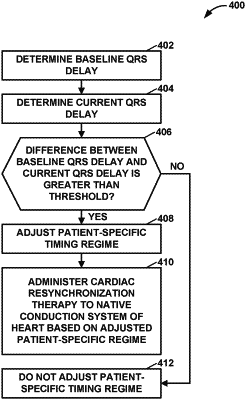| CPC A61N 1/3684 (2013.01) [A61B 5/353 (2021.01); A61B 5/366 (2021.01); A61N 1/37512 (2017.08)] | 23 Claims |

|
1. A method comprising:
generating, by sensing circuitry of an implantable medical device system, signals representing activity of a heart of a patient;
determining, by processing circuitry of the implantable medical device system, based on the signals, an intrinsic delay of the heart of the patient;
determining, by the processing circuitry, whether the intrinsic delay is indicative of a first-degree heart block being present in the heart of the patient;
determining, by the processing circuitry, a patient-specific timing regime for conduction system pacing based on whether the intrinsic delay is indicative of the first-degree heart block being present in the heart of the patient;
administering, by therapy delivery circuitry of the implantable medical device system, cardiac pacing to a native conduction system of the heart of the patient based on the patient-specific timing regime;
determining, by the processing circuitry, a baseline QRS delay based on the signals, wherein the baseline QRS delay is based on a set of determined differences in time between an atrial sense event or an atrial pace event to an end of a QRS complex;
determining, by the processing circuitry, a current QRS delay based on the signals, wherein the current QRS delay is a difference in time between a current atrial sense event or a current atrial pace event and an end of a current QRS complex;
determining, by the processing circuitry, whether a difference between the current QRS delay and the baseline QRS delay is greater than a threshold; and
based on the difference between the current QRS delay and the baseline QRS delay being greater than the threshold:
adjusting, by the processing circuitry, the patient-specific timing regime; and
administering, by the therapy delivery circuitry, the cardiac pacing to the native conduction system of the heart of the patient based on the adjusted timing regime.
|